How to Start a Pressure-Washing Business
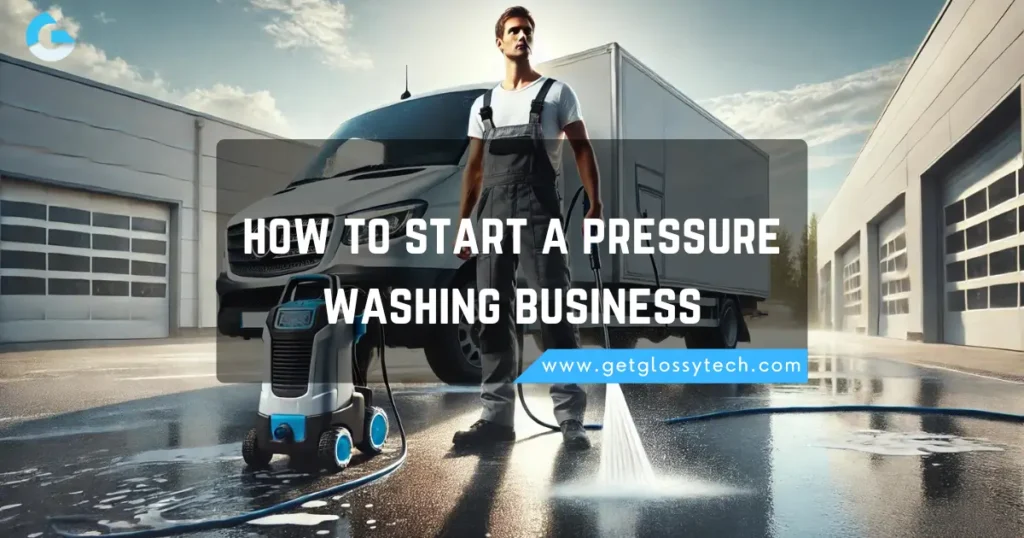
If you’re thinking about starting your own business, a pressure-washing service might be a great choice! Whether as a side gig or a full-time operation, it’s a lucrative way to make money. Let me guide you on how you can start your journey with zero expertise but a lot of determination.
With this knowledge and some sweat equity, you can dove headfirst into the suds and spray. Remember, every drop of water that streams from your washer can lead to your next big break!
Pros Of A Pressure Washing Business
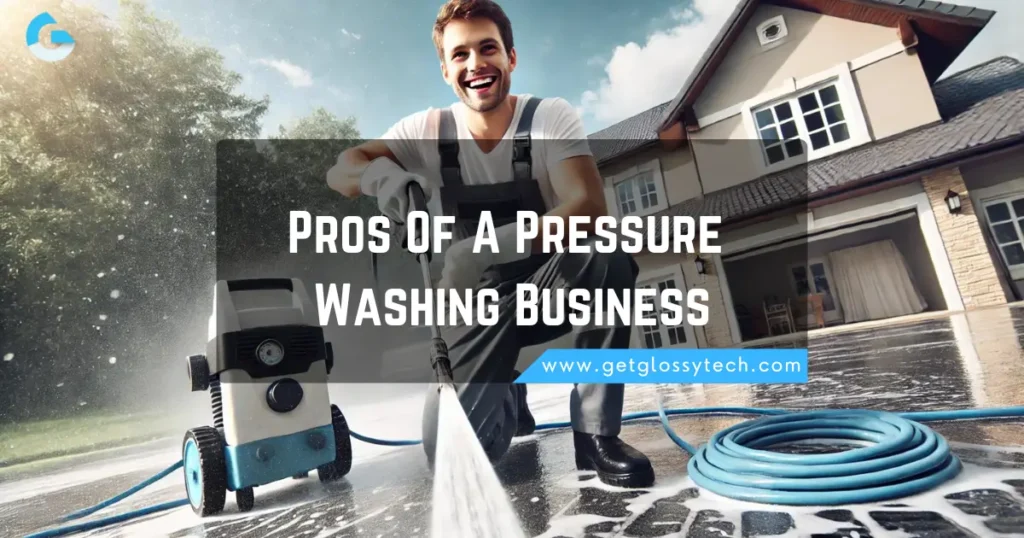
- Low Startup Costs: Starting a pressure washing business usually requires minimal startup costs, making it easier to launch without a heavy financial burden.
- Freedom and Control: You gain significant freedom to choose your clients and control your workload, allowing you to take on as much or as little work as you prefer, including the ability to turn down projects that don’t fit.
- Building Customer Relationships: High customer retention rates are key in this business. Providing reliable service and effectively solving customer issues establishes you as an indispensable resource, enhancing loyalty among clients.
- Empowerment from Autonomy: Operating as your boss allows you to make all the decisions regarding the operations of your business, offering a sense of empowerment and liberation.
- Community Engagement: Participating in local community events, like craft shows or farmers’ markets, can significantly gain exposure and attract new clients through direct, human face-to-face interaction.
- Referrals and Growth: Impactful interactions and quality work lead to referrals, where satisfied customers refer friends and family, helping to expand your network and retain a solid foundation of repeat business.
These points combine to offer not just a career but a chance to create a valuable service that you can be truly passionate about while building a successful business.
Cons Of A Pressure Washing Business

- Income instability: A pressure washing business often faces inconsistent cash flow, making the income less stable. Owners need to carefully budget for slow times, a reality that can be stressful and financially challenging.
- Investment and expenses: Starting this business requires a big time and money investment. The costs include purchasing equipment, which is costly and prone to break down, leading to further expenses in repairs.
- Operational challenges: The self-employed nature means you handle all responsibilities and decisions, from answering phones to managing transactions. This extensive involvement can strain on friends and family and create uncomfortable social and business situations.
- Physical demands and liability: The job involves significant physical activity and repetition, which can be demanding on a 24/7 basis. Liability issues and insurance premiums increase when equipment gets damaged. Additionally, spending time behind the wheel can lead to traffic delays and dangerous moments.
These points emphasize the need for strategic planning, from creating effective processes and procedures to communicating with potential customers to overcome the longer conversion funnel.
It’s vital to maintain a good work environment, providing incentives and support to motivate employees and foster their creativity in diversifying product lines and enhancing revenue streams.
10 Steps To Start a Pressure Washing Business
Here are 5 Steps To Start a Pressure Washing Business that will help you splash into success and turn that grime into shine in no time!
1: Establish a Business Structure

Choosing the right business structure is key to starting a pressure-washing business. Here’s a quick guide:
- Sole Proprietorship: Easy to establish with less paperwork, but no protection against personal liability.
- LLC: Provides personal liability protection and flexibility.
- Corporation: Best for large operations, offering significant personal liability protection and tax benefits.
First, choose a unique business name; file it after checking for competing business names through your state’s secretary of state’s office. If using a different name, consider doing business as (DBA). Always use your Social Security number for filing purposes, unless your business entity demands otherwise.
Consult legal experts to recommend the best business structure to limit personal liability and ensure all paperwork is correctly handled. Make sure your business entity includes all pertinent contact information to stay legally compliant.
2: Gain Practical Knowledge
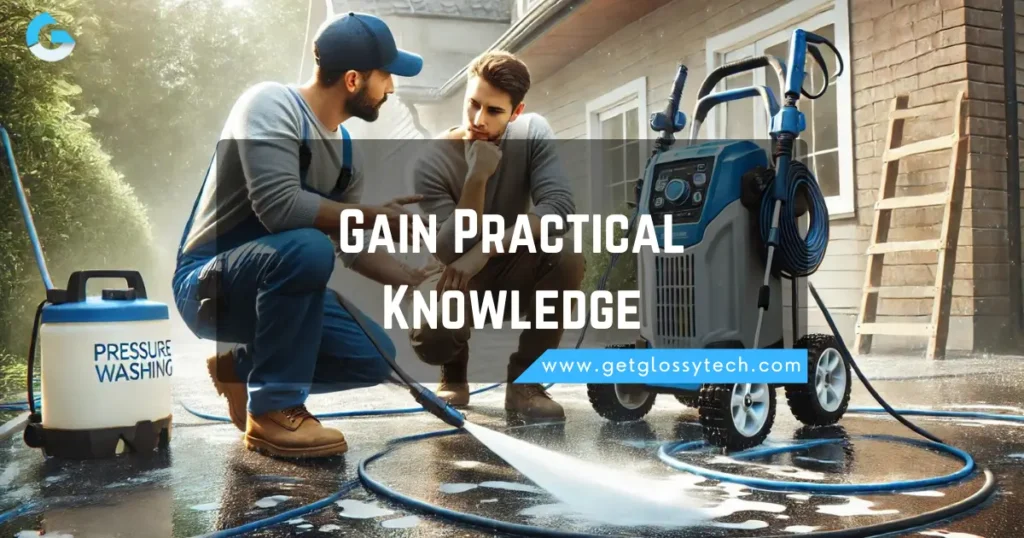
When I first started my pressure washing service, I dove into months of learning. I watched countless YouTube videos and read numerous online reviews. I wasn’t just absorbing information; I practised what I learned at home by offering to clean the homes of family and friends for free.
This hands-on experience wasn’t rocket science, but it was invaluable. They gave me great input and even my first-star review! Within days, I felt confident enough to take on clients and really live what I had learned.
3: Acquire Your Tools and Materials
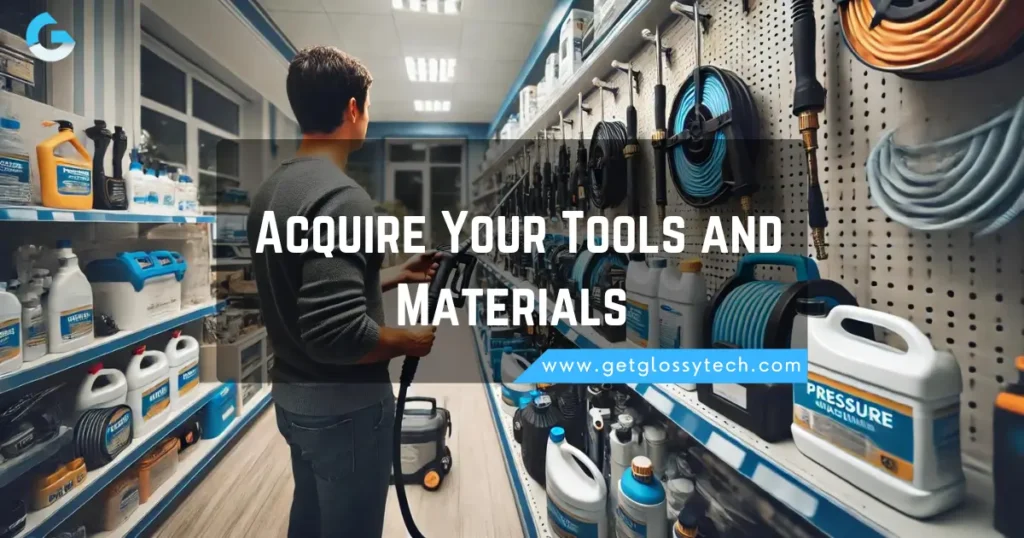
To kick off your pressure-washing business, consider these steps:
- Choose the right type of pressure washer: Electric pressure washers cost about $200 and suit smaller, indoor, or residential jobs. For tougher tasks, a gas-powered heavy-duty pressure washer might be better, starting around $400.
- Start smart by renting your equipment to save on initial costs. You can rent washers from places like Home Depot or Lowes, helping you test different models.
- Purchase essential gear like chemicals, nozzles, and surface cleaners to ensure you’re prepared for any job.
4: Register Your Business
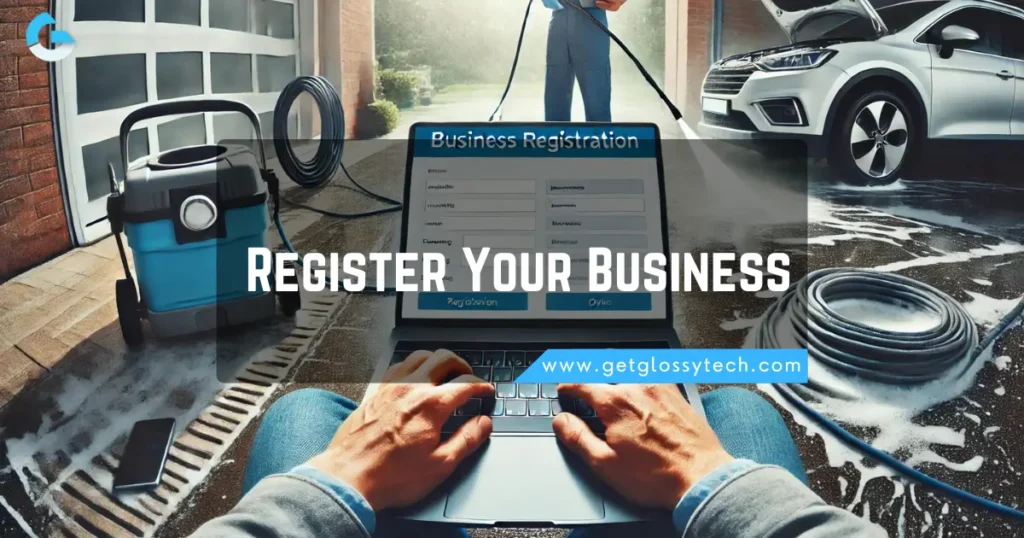
When starting your pressure-washing business, you’ll need to register your company to make everything official. Picking the perfect name is exciting, but registration can feel overwhelming. Trust me, I’ve been there.
To save time and avoid frustration, check with your state to see what’s required to set up a business. You’ll also need a Federal EIN, which is like your company’s ID number.
Once you’ve got that sorted, make sure to create business email addresses. Many services even offer free options for that.
5: Determine Your Pricing
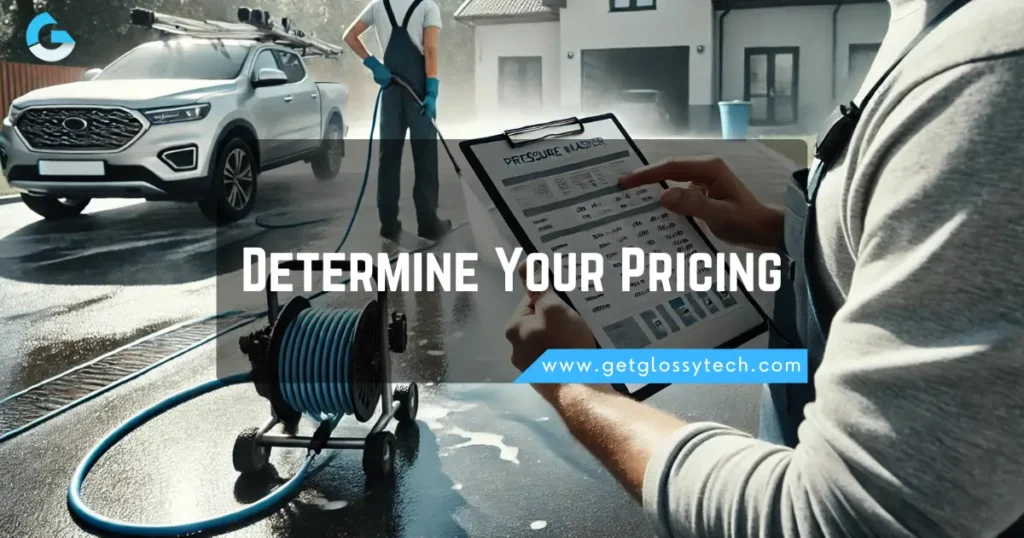
To determine your pricing, check the market in your area and see what other pressure washers are charging. Rates usually range between $192 and $401, depending on the job, like cleaning driveways, windows, or fences.
Your prices should cover your time, effort, and supplies, such as a gas pressure washer. Use secret shopping to understand both high and low pricing, helping you stay competitive and attract customers.
You can charge an hourly rate or price by project, but remember to factor in the time needed for each job. Knowing your clients and consumers well ensures you price for profit while offering value. With practice, you’ll master the craft of pressure washing homes, sidewalks, and walls, which will grow your business.
6: Verify Local County and City Licensing Regulations
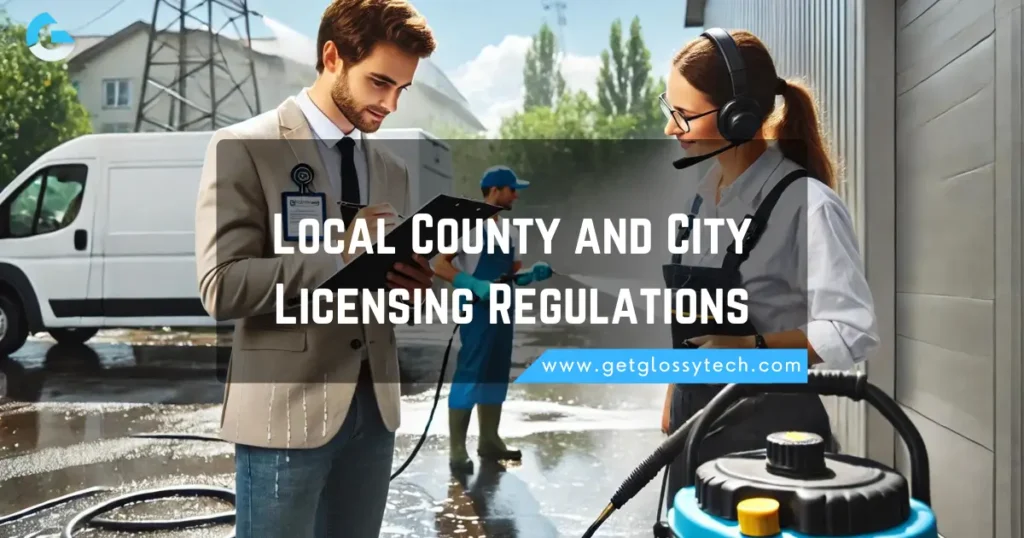
When you’re starting a pressure washing business, it’s important to call your county and city to find out the specific licensing requirements. Every region has different rules, and in states like Florida, you’ll likely need a license to operate legally.
Not all pressure-washing businesses realize this at first. You must make sure your business is fully licensed to avoid fines. Many pressure washing companies forget to advertise that they are properly licensed, which can lead to problems.
So, as you prepare to start your business, take the time to verify your county and city regulations and ensure you meet the specific requirements. This step will set you up for success while protecting your business in the long run.
7: Set Up Your Banking

Open a business bank account for your company so you can keep track of income and expenses. This account will help separate personal and business transactions, which is important when dealing with the IRS or filing taxes.
If you’re setting up an LLC or a corporation, you’ll need to get a tax identification number (TIN) or Social Security number to fill out Form W-7. Having all your documents in order will make it easier to deposit payments like cash, checks, and credit card payments from clients.
Next, connect a payment gateway to handle these payments. Make sure the fee for using the service fits your pricing model, so you don’t lose profit. Keep track of every transaction, so your company stays on top of both income and expenses.
8: Get Business Insurance

Starting a pressure-washing business means you need insurance to protect yourself. If something goes wrong at a homeowner’s property, they’ll want proof that you’re covered. Find reasonable companies offering commercial insurance to keep you safe.
Having the right coverage lets you perform bigger jobs without the fear of losing money. In the long run, this investment can pay off and make your business more lucrative!
9: Develop Marketing Avenues
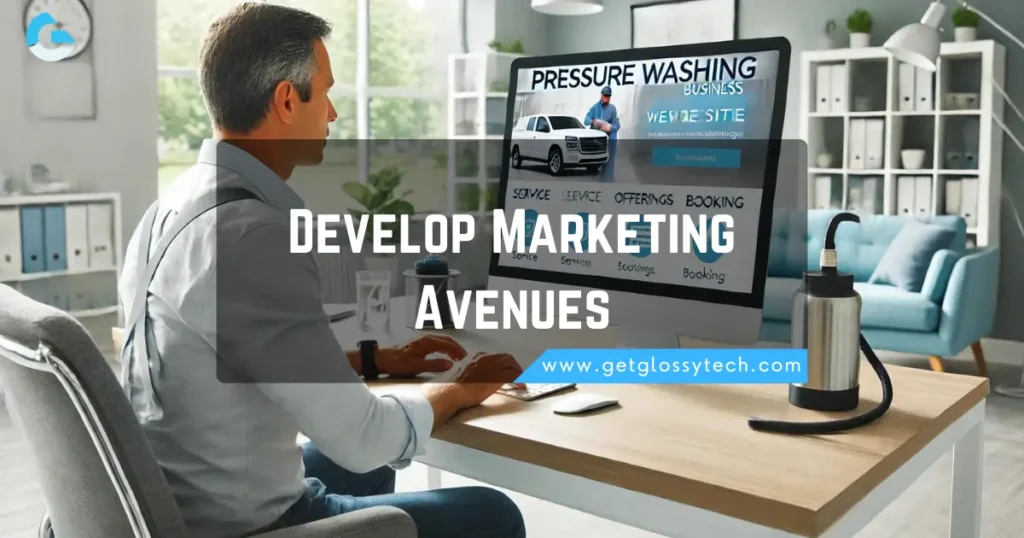
When starting a pressure-washing business, finding effective marketing avenues is key. You can begin by creating a catchy business name and designing business cards that display your contact information.
Here are some effective strategies to consider:
- Use online listings like creating your own website, Google Business pages, Yelp, and Facebook to reach a wider audience.
- Post before and after pictures on Instagram Reels or TikTok. These visuals show how a dirty facade can transform into something beautiful, sparking interest in your work.
Next, leverage word-of-mouth referrals by asking friends and family to spread the word. Joining local groups on platforms like NextDoor can help you connect with potential clients.
Consider running ads with a $10-a-day budget to test different strategies and reach more people:
- Promote an introductory special to drum up business.
- Highlight the satisfying process of your work to attract homeowners.
Remember, keeping your service accessible and engaging is the secret to a steady stream of work that builds your reputation and growing profits over time.
10: Supply Procurement
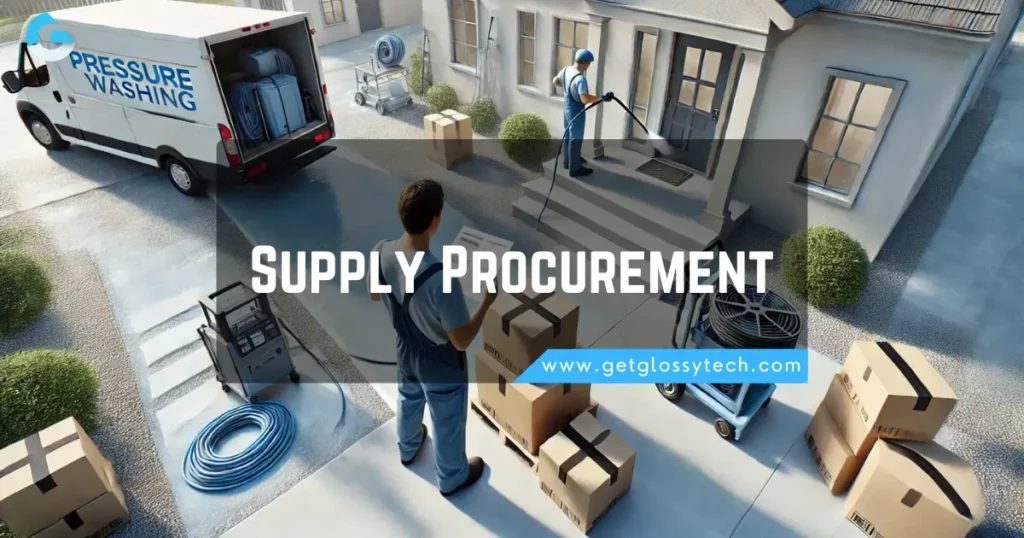
When you start a pressure-washing business, knowing where to get your supplies is key. You’ll need a good vehicle like a trailer to carry your equipment. Essential items include :
- Pressure washers
- Wands
- Brushes
- Cleaning surfactants
A few extra tools, like towels and postcards, can help you with marketing while you tackle jobs. Research and find suppliers who can give you the best deals.
Consider making connections in your community. This is a good way to discover common jobs that need cleaning services.
Volunteer for local events to promote your idea. Share your services, and you might get many cards in return. The right supplies are what will make your business almost ready to thrive!
FAQs: How to Start a Pressure-Washing Business
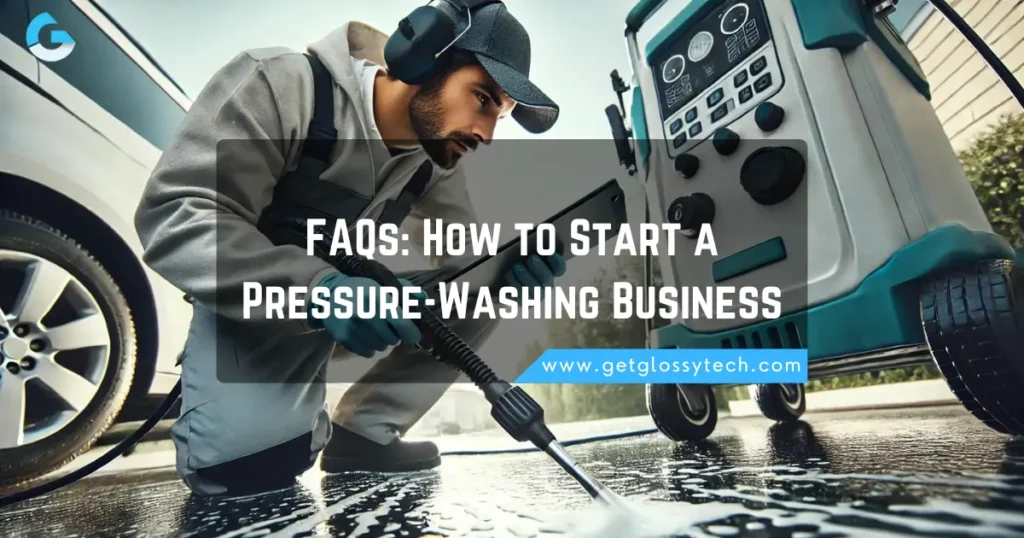
1: How profitable is a pressure washing business?
A pressure-washing business can be quite profitable. On average, owners earn between $50 to $150 per hour, depending on the services offered and location.
With low startup costs, usually around $5,000, and the potential for high demand in residential and commercial markets, it’s possible to see a strong return on investment.
Many successful owners report making over $100,000 annually after establishing their client base. Proper pricing, quality services, and good marketing can significantly boost profitability.
2: Is it hard to start a pressure-washing business?
Starting a pressure-washing business can be both exciting and challenging. While the initial setup requires some capital for equipment and proper planning, the process is straightforward.
You’ll need to understand your pricing, find customers, and navigate any obstacles that arise. With dedication and a willingness to learn, you can build a successful venture in this competitive market.
3: What PSI pressure washer do I need to start a business?
To start a pressure-washing business, a washer with a PSI (pounds per square inch) rating between 2,500 to 3,000 PSI is ideal. This range provides enough power to effectively clean driveways, sidewalks, and home exteriors without causing damage. Consider also investing in a commercial-grade machine for durability and efficiency.
4: How do you get the first pressure-washing customer?
To get your first pressure washing customer, promote your services on social media and in local community groups. Offer a limited-time discount to attract attention. Distribute flyers in your neighbourhood and ask friends and family for referrals.
Have a clear pricing structure and confidently explain your services. Quality work will lead to repeat customers and referrals.
5: What chemicals to use for power washing?
When power washing, use a mix of chemicals to tackle different surfaces effectively:
- Detergents: These help break down dirt and grime. Look for biodegradable options to protect the environment.
- Bleach: Ideal for removing mold and mildew, especially on concrete and siding. Always dilute it properly to prevent damage.
- Acid-based Cleaners: Useful for tough stains on brick or stone surfaces. They help restore the original look but should be used with caution.
- Algaecides: Effective against algae on roofs and decks, keeping surfaces clean and safe.
Always follow safety guidelines and manufacturer instructions when using these chemicals.
6: What is the difference between pressure washing and power washing?
Pressure washing and power washing are similar but have key differences.
- Pressure washing uses high-pressure water to clean surfaces, making it ideal for tougher grime and dirt.
- On the other hand, power washing also utilizes high-pressure water but adds heat to the water, which helps break down stubborn stains more effectively. This makes power washing better for surfaces like driveways and decks, where tough stains need extra help.
In summary, the main difference lies in the temperature of the water used.
Bottom Line: How to Start a Pressure-Washing Business
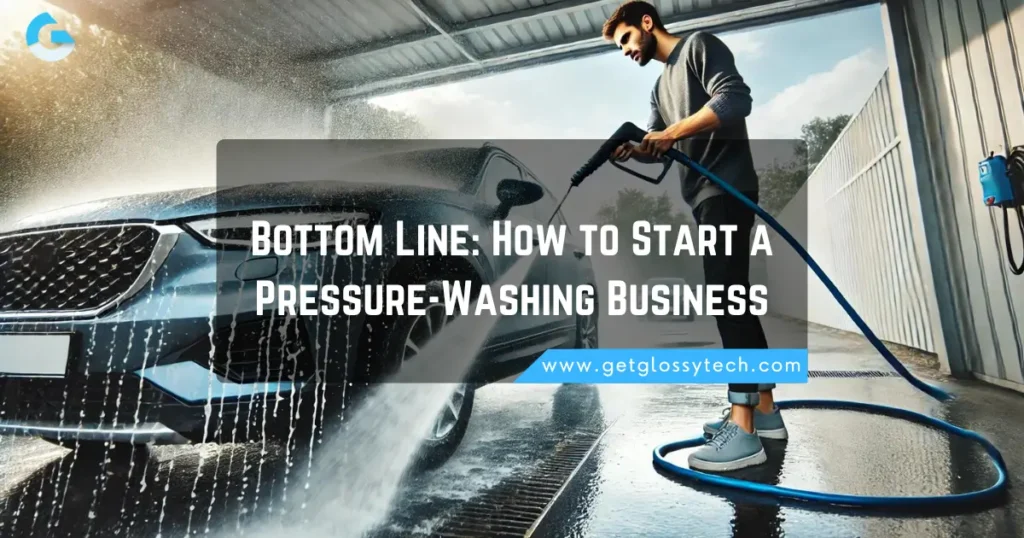
Starting a pressure-washing business is a rewarding venture that requires careful planning and the right equipment. Invest about $5,000 for a solid setup, or consider leasing gear to minimize initial costs. Determine your pricing by researching competitive rates to draw in customers.
Expect challenges along the way, such as managing setbacks in the Florida sun. Embrace these obstacles as opportunities to learn and grow. Each experience offers guidance and inspiration for the future. Celebrate your triumphs, as they shape a vibrant and bright business ahead, serving as a beacon of success in your community.
